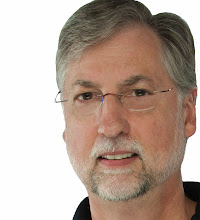David Warlick has an insightful post on his
2 Cents Worth blog --
More on School 2.0 -- with the following comparisons between School 1.o...
Teachers deliver content and skills, students are mirrors, reflecting content and skills back to the teacher (or government). If the reflection is in the image of the teacher and the state’s standards, then success has been achieved — regardless of any continuing affects on the students abilities to prosper in a rapidly changing time.
...and School 2.0...
Teacher’s become learners and learners become teachers, and each side is empower with conversation, control over their information landscape, and connections with each other — with almost no constraints of hierarchy.
And in David's inimitable way, he has characterized this shift with this pithy statement:
Students stop being mirrors, and instead become amplifiers. Their job is not merely to reflect what they encounter, but to add value to it.
David also has two great diagrams of School 1.o and School 2.o to illustrate.
Here is the School 2.o diagram:
This is a great way of capturing the transformative shift we are all aiming for. As I read the post, I couldn't help envisioning the mirrors (students) in School 1.0 morphing into prisms in School 2.0 both amplifying and refracting ideas and information in all directions -- like a superconducting super collider for education!
The one exception I'll take to David's post is in his opening paragraph statement:
But most everyone now knows what a blog is, wikis hold no mystery, we’ve gotten over wikipedia, and podcasting is no longer the “next big thing.”
I can understand David's perspective. He's been banging the drum for quite a while now, and he's probably seeing a change in his audiences from "wow, gee whiz" responses to a lot of nodding of heads -- many bent over their laptops busily blogging their reflections or capturing notes on a wiki for colleagues or a future podcast. But, David's audience is often made up of the vanguard -- those ready and willing to embrace the technology and the educational reform. We, in turn, go back to our schools and work with many teachers that are just getting past the notion that the technology is inevitable and are struggling with the day-to-day pressures of conflicting local initiatives without little time to breathe, let alone reflect. I'd have to say the vast majority still are not clear on the differences between a blog, wiki, or podcast or, more importantly, why it makes a difference for education. I think there's lots more work for us to do in that arena.
Just this past Monday, we had
Will Richardson do a day-long workshop in our
district for about 40 teachers and administrators. Will did an amazing job (as always) of delivering a compelling case for the impact of Web 2.0 tools on education. But I spent over an hour afterward continuing the conversation with several attendees helping them digest and sort out Will's presentation. For many, this was the first time they had spent any substantial time considering these tools and their potential. To be sure, there were a few in attendance who already have blogs and have done some podcasting and worked on wikis -- even a number who have used these in class with their students. But the majority were still in the "wow, gee whiz" phase. So there is much yet to done at the school and classroom level.
But, David, please move ahead. The implications of School 2.0 as an extension of the Web 2.0 metaphor is an important one as we all figure out how education must adapt to the ever changing tools of collaboration and connective technology.





